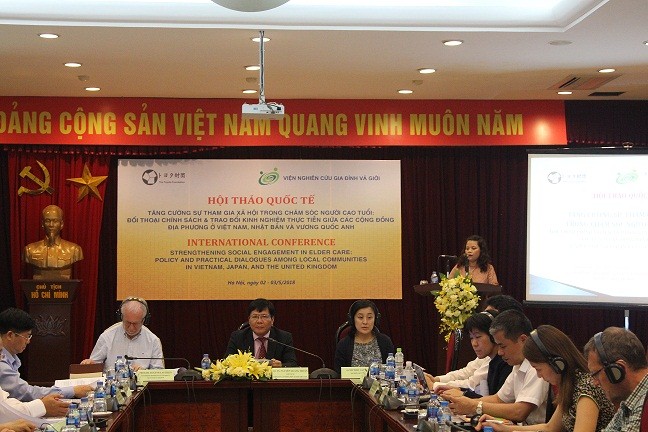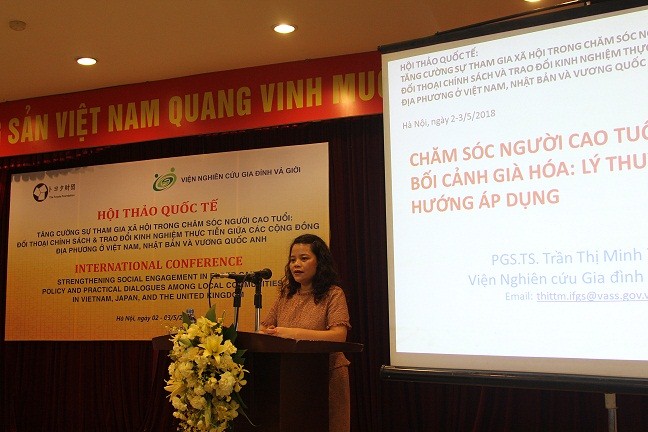Attending the workshop were Prof. Dr. Nguyen Quang Thuan, President of the Academy; Assoc. Tran Thi Minh Thi, Director of Institute for Family and Gender Studies; Prof. Nguyen Huu Minh, President of the Vietnam Society of Sociologists, Editor in Chief of the Journal of Family and Gender Studies; Michiru Sasagawa, Toyota Foundation Representative; Prof. Hugh McLaughlin, Manchester Metropolitan University, UK; Representatives of the Ministry of Health, Ministry of Education and Training, Ministry of Labor, Invalids and Social Affairs, Central Vietnam Elderly Association, JICA (Japan International Cooperation Agency); Representatives of research institutes, universities, international organizations, non-governmental organizations at home and abroad, scientists and researchers in the field of family and gender in Vietnam, Science comes from Manchester Metropolitan University (UK), Kumamoto Gakuen University, Kyoto Sangyo University (Japan).
Throughout the various stages of development and reform, different age levels of population, Japan, Vietnam and the United Kingdom have many similarities and characteristics in the elderly care model.
The Japanese Society develops life-long-life insurance programs for the elderly with a balanced involvement of families, communities and markets to provide a diverse package of care for this population. In Vietnam, the community still plays an important role in spiritual care for the elderly. At the same time, with the traditional family structure influenced by Confucianism and filial piety, the current care activities in Vietnam are still mainly related to the role of the family. Viet Nam is also working to develop and improve the institutional framework and services of EL in cooperation with families, mass organizations and the private sector. In England, the rapid aging rate and the aging population make up 21% of the population by 2016. The rapid increase in the number and cost of elderly care has become the most important motivator for changing the needs of health care and care in modern Britain. Statistics have highlighted that the growing complexity of the elderly's health care needs from a long-term perspective and weak health is a key driver of social care needs for the elderly.
In the context of aging population and many social and policy issues in elderly care, the Institute for Family and Gender Studies has developed the theme of "Strengthening Social Participation in Care the elderly in the context of transforming economic and family structures in Asia: policy and practical dialogue between local communities in Vietnam and Japan, 2016 - 2018 with funding from Toyota Foundation, Japan, by Assoc.Dr. Tran Thi Minh Thi is the owner.
 |
 |
Opening remarks at the workshop, Prof.Dr. Nguyen Quang Thuan warmly welcomed the participation of the participants; At the same time, EL care is a topic that has received increasing attention in both theoretical and practical terms, especially in the context of emerging Asian societies such as migration, Work pressure, individualization tendencies, and transforming family functioning structures are posing challenges in traditional care and tradition. In addition, the rapid aging of the population is also a major challenge for Vietnam in particular and countries in general about the social protection and welfare system as well as other sectors (economic, life, infrastructure, policies, family relationships, spiritual life...).
Prior to the changes in economics, society, culture, innovation and international integration, many scientific research questions and practices such as adaptation, self-change, integration with the current process. The economy and market economy of the NCT; the changing role of each subject in care today; Institutional and structural factors need to be met to meet the needs of the society. Accordingly, the Chairperson emphasized the importance of linking scientific research results with the management and policy-making process, in order to ensure social policies in general and policies for the elderly. It is built on the basis of scientific basis, ensuring the conformity and authenticity; It is expected that scientists actively listen, exchange and comment from experienced managers from central to local levels to verify the reliability of the research results and to propose realistic policy responses. The Chairman expressed his hope to continue to receive cooperation from the community of scientists, managers and policymakers in order to further develop theoretical and practical studies of the elderly in the past time to come.
The workshop received 16 reports, divided into 03 panel discussions focusing on analyzes from various theoretical perspectives and the application of elderly care models in the context of population aging; Opportunities and Challenges from Aging in Viet Nam and Policy Issues (Health Insurance Roles) Faced with High Aging Population and Socio-Cultural Characteristics Vietnam where the community still plays an important role in spiritual care for the elderly. Some presentations also show Vietnam's efforts to develop and improve the elderly care and institutional framework based on collaboration with families, mass organizations and the private sector.
Presentations at the workshop also addressed the current situation and proposed some solutions to improve elderly care activities conducted by private companies in Vietnam (compare and learn from Japan) The Some models of elderly care in rural Vietnam (implemented from the elderly care club when the children go to work away and the role of local authorities in Thach Chau commune, Loc Ha district, Ha province. Static); approach to social security of the elderly in rural areas.
The workshop is a useful academic exchange forum to create a bridge, share knowledge and practical experiences between researchers, policy makers and managers, activists, social practitioners. In the field of domestic and international elderly care. Throughout the workshop, the research findings as well as the policy-making process and social practice related to elderly care will be closely linked, contributing to the achievement of scientific research into life, close Contribute further to the process of building social development in Vietnam in the future.
Nguyen Thu Trang







